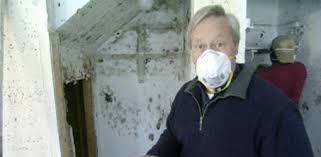mold smell from ac unit

Musty smells may not be noticeable when the air conditioner is off. Air conditioning, particularly central air, is a luxury for some and a necessity to others. Either way, it's supposed to make you comfortable, and that's not possible if there's an unpleasant, musty smell coming out of your vents. That smell is mildew, and it indicates that there has been moisture in the duct system and that the unit may require maintenance. Once repairs are complete, you will still need to get rid of all lingering odors and eliminate any possible health hazards associated with inhalation. Check the area around the return duct for a handle. Slide the filter out and purchase a new one at your local home improvement store. Slide the new filter back into the slot. Unscrew the condensate drain from the coupling at the drip pan with a wrench and remove the drip pan. Do not attempt to remove the pan if the housing is completely inside the unit. Clear any debris in the drain and pan. Pour some bleach or white vinegar into the pan and onto a rag.

Clean the end of the drain with the rag and replace the pan. Wait a couple of days to see if the smell has dissipated. Check the ducts in the basement or attic for leaks while the blower is on. If air is leaking out, it also means that moisture is leaking in and forming mold within the ducts. Call a professional if the ducts are leaking or if there is still a smell after cleaning the drain and tray. If there is, the mold may be collecting inside the unit itself. If that's the case you'll need to have the unit cleaned by a professional.
rheem ac unit not blowing coldThings You Will Need Replacement filter Wrench Bleach or white vinegar Rag Warning References Alan Vryhof, Licensed General Contractor;
car ac repair clearwater flThose of you who read our articles regularly, know that we are a small, U.S. Veteran-Owned company in Southern California, and pride ourselves in giving people honest, straight answers to their questions.
cost of freon for ac unit
This will be no different. So, what is dirty sock syndrome? “Dirty Sock Syndrome” is when your air conditioner gives off a foul, moldy or mildew-like smell when you turn it on. If you notice that your house smells like your son just put his gym socks into your air conditioner or if your house generally smells musky or like a gymnasium when your air conditioner kicks on, then you could have dirty sock syndrome. I think it is important for me to point out at this point that no, I am not joking. This is a real problem that people face and it is actually called ‘Dirty Sock Syndrome’ in the HVAC industry. In Santa Clarita, we get questions about this from time-to-time, usually in the springtime when people are transitioning their HVAC units from heating to cooling mode. So, what causes dirty sock syndrome, and is it dangerous to me or my family? In this article we will briefly explain what it is, what causes it, if dirty sock syndrome is dangerous, and what you can do to fix it.

Dirty sock syndrome is the foul, moldy smelling odor that comes from your air conditioner when you first turn it on. It is caused by the build up of mold and bacteria on your evaporator coil. Mold and mildew can grow due to the moisture that builds up on your coil through continued use, is fueled by the dust that collects in your air conditioner over time from inadequate filtration and is especially common when your unit goes from a period of heating to cooling. Especially in the Springtime in Southern California and the southern states, it is not uncommon for the heat to be on in the night and morning, only to transition to a period of cooling later in the day. This heat mixed with dust and moisture in the darkness of your AC unit is the perfect recipe for dirty sock syndrome. These are some of the reasons that it is so important to prevent mold and to provide adequate filtration for the air entering your air conditioner. In fact, did you know that the air conditioning filter that you replace every few months is actually for your air conditioner, not for you?

Here are a couple of articles on preventing mold in your AC unit and how to properly choose your air conditioning filter: How Do You Prevent Mold? These 5 Tips Can Help. Air Conditioning Filter – How Dirt and Debris Can Affect Your Air Conditioning System. Before going to general quarters, it is important to rule out some other possibilities before jumping to the conclusion that you have dirty sock syndrome. Here are a few things to rule out before calling your local HVAC contractor: If you have done these things and are still suffering from moldy, noxious smells when your air conditioner kicks on, then it might be time to call your local HVAC contractor. For information on choosing the right contractor, make sure you take a look at: How to Choose a Contractor – 5 Tips You Must Know. The short answer is, it depends. Usually the answer is no, dirty sock syndrome is not dangerous. Dirty sock syndrome is caused by a variety of bacteria and mildews, none of which are harmful to your health under normal circumstances (normal immune system, etc).

Where you can get into a dangerous area is if mold gets introduced into your HVAC system and begins to grow. Mold can be a health risk to you and your family and should be handled appropriately. Don’t go crazy just yet though – as a general rule, the CDC reports that most molds are only mildly toxic to humans and that symptoms in even heavily infested homes rarely progress past chronic coughing and wheezing. This is obviously not desirable though, so mold should be reported to your landlord or properly handled as soon as possible. After I just got your blood pressure up, it is important to keep in mind that just because you have dirty sock syndrome doesn’t mean that you have mold, so don’t go off the deep end; just open up your system and see what you’re dealing with. Where we start to run into problems with dirty sock syndrome is if someone in your family suffers from asthma, severe allergies or has a compromised immune system (chemotherapy, etc). For instance, my wife suffers from moderate asthma and we take mold and allergens very seriously because we have to, using only high-quality air filters and I even clean our evaporator coil once every few months (I’ll show you how to do this in the next section).

We’ve added a stand-alone air purifier to our bedroom and a UV air purifier to the air conditioner as well just to be safe and it works pretty well for us. You have customizable options – your household might be different, so it is worth a little looking into (if you have questions, just give us a call and ask). Dirty sock syndrome doesn’t automatically mean that you have mold, but it does mean that your AC unit is providing the right conditions for mold to grow and thrive, so keep an eye on it. We will address how to deal with it in the next section. Dirty sock syndrome isn’t usually dangerous and it isn’t going to kill you, but you should still address it if it becomes a problem to say nothing of the fact that it just plain stinks! For more information on mold and possible side affects of living with mold, take a look at the CDC: If you have a loved one who suffers from severe allergies or from asthma, try reading up on this: How to Reduce Asthma Symptoms and How Your Air Conditioner Can Help.

The most important factor in preventing dirty sock syndrome is to make sure that you choose a high-quality air conditioning filter. Mold, mildew and bacteria need dust and other porous substances to thrive. Removing these from the air before they get into your coils is one of the key ways to prevent dirty sock syndrome. The second way to prevent mold and bacteria from growing on your cooling coils (called evaporator could) is to use a UV air purifier. These air purifiers have been used in hospitals for decades and quickly kill bacteria, mold and it’s spores. At All Systems Mechanical, we install a UV air purifier on any job where our client reports allergy, asthma problems or a compromised immune system, so it might be worth asking your HVAC contractor if you have a problem with these as well. There are several companies on the market that make UV air purifiers, but I have always been a fan of Honeywell. They make quality products and are reliable. A list of their UV air purifiers can be found below:

Start by checking your drainage pan for standing water and make sure it is draining properly. You can buy dissolvable tablets at a hardware store or online that will keep these drains clear. After ruling out the drainage pan and other possible contributing factors, you should start by adding the preventative measures listed above (quality air filter and UV air purifier) as these are key to keeping it from coming back (what’s the point of cleaning it if it is just going to be back in a few months). Then, you’ll have to clean your evaporator coil to get rid of the dirt, mold and bacteria that is already there – here’s how: Is dirty sock syndrome dangerous? Not usually, but it can be annoying and downright embarrassing. After all, who wants their house to smell like a locker room? These smells and odors are a direct result of the mold and bacteria that can collect in your air conditioner, but there are several ways to prevent and treat them. If something your contractor is telling you doesn’t seem quite right, or you need a second opinion, consider using our Online Air Conditioning Consultation Service.